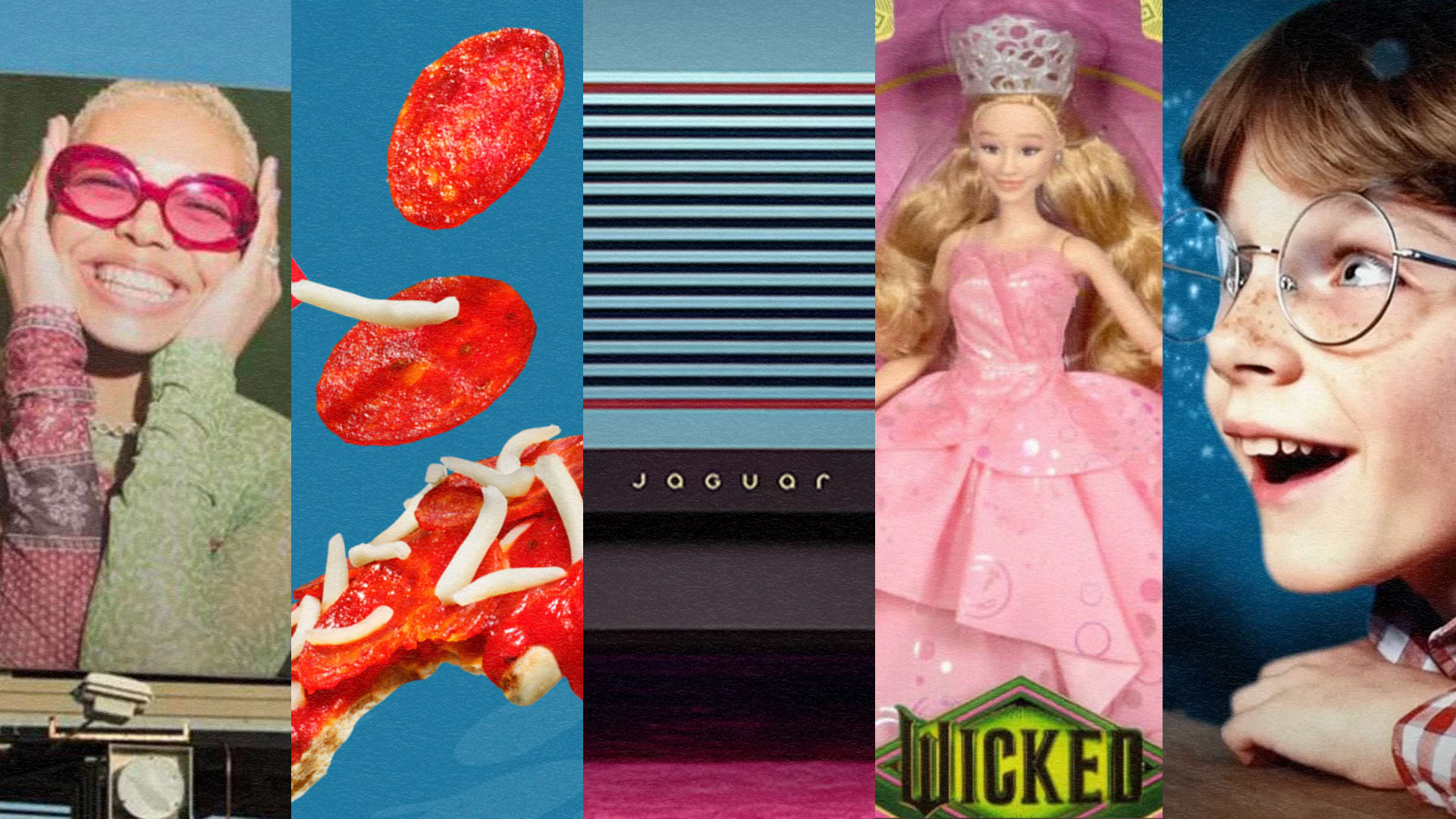These companies had a terrible, horrible, no good, very bad year.

[Photos: Bumble; Lunchly; Jaguar; Mattel; Toys “R” Us]
Building a successful brand is difficult. It requires the fine-tuned execution of a myriad of parts, which will appear in nearly as many contexts: packaging with just the right shelf appeal, a fine-tuned, scalable logo, clicky-yet-authentic copy, and visuals. Nearly every company is bound to make a mistake at some point. But this year, a few big names really messed up.
Jaguar’s controversial rebrand
In November, the 90-year-old sports car brand Jaguar announced that it would scrap its existing branding (and car models) in favor of becoming a luxe, all-electric brand. The risky strategy seems to be a last-ditch effort to revive the struggling company, which sold 43,000 vehicles globally in 2023 compared to 179,000 in 2017. To really play up the major transformation, the company announced this shift before actually unveiling any of its new electric models. Instead, it used a series of ultra-colorful, space-inspired concept videos to convey a sense of mystery and newness.
The very early response to Jaguar’s new branding was pretty entertaining, with plenty of creative ribbing directed at the company for the funky videos. But the internet, as it so often is wont to do, promptly sucked all the fun out of the initial jokes by turning to large-scale hand-wringing from armchair critics who bemoaned the rebrand’s failure on LinkedIn. Then, right wing news outlets capitalized on the news cycle by turning a rebrand into a political wedge issue by suggesting Jaguar’s weird new look is a symptom of the “woke mind virus.”
Whether this is a true financial flub for Jaguar remains to be determined, as the company doesn’t plan to release its new EVs until 2025 at the earliest. Early data from Auto Trader suggests that the right wing backlash may have actually spiked interest in Jaguar vehicles. Whatever the case, it’s safe to say that few people were thinking about Jaguar in 2023, and the same certainly cannot be said in 2024.
Logan Paul’s (allegedly) moldy Lunchables dupe
Back in September, YouTubers Logan Paul, KSI, and MrBeast announced Lunchly, a series of boxed meal kits billed as a “healthier” alternative to Lunchables. But the kits’ supposed health was quickly called into question when several creators, including TikToker Rosanna Pansino and Twitch steamer @aSpicyCow, discovered mold in their mini pizza ingredients.
Even before the mold scandal, Lunchly didn’t look so good—literally. The brand’s combination of clunky font, lifeless product photography, and packaging promoting the YouTubers’ other CPG brands gave it an air of a school project that’s been hastily scraped together the night before it’s due. Now, the YouTubers involved are receiving a generous dose of backlash for the product. For MrBeast, who was already embroiled in a litany of unrelated controversies, it’s the mold on top of a very rough year.
Mattel’s accidentally R-rated ‘Wicked’ Barbie boxes
No one on Mattel’s PR team was dancing through life the week of November 11. That Monday, news had spread far and wide that a URL printed on the back of Mattel’s Wicked movie Barbie boxes led not to the film’s official website, but to a parody porn site of the same name.
Mattel worked quickly to issue an apology, help pull the dolls from shelves, and reissue new Wicked figurines in appropriately PG boxes. Even so, Mattel was hit with a class action lawsuit regarding the dolls just a few weeks after the initial news broke. According to the South Carolina mother who filed the suit, her daughter suffered “emotional distress” after accidentally visiting the offending site. It looks like it’ll take a lot more than one short day of crisis management for Mattel to move on from this error.
Bumble’s big fumble
This May, the dating app Bumble pulled off a true feat when it found a way to make the concept of online dating even more exhausting than it already is. In an effort to promote new in-app features, the company launched a campaign that was meant to take a tongue-in-cheek approach to the masses of people who are fed up with “the apps.” The campaign used language like, “You know full well a vow of celibacy is not the answer” and imagery of a nunnery to convey the idea that women shouldn’t have to resort to loneliness because of too many bad dates.
Ultimately, though, the whole campaign ended up coming off tone deaf, with commenters expressing their concern that it invalidated womens’ sexual autonomy, the experiences of asexual people, and fears around restrictions on reproductive rights. Bumble quickly deleted the posts associated with the campaign and issued an apology, but not before the whole fiasco garnered its own name: “The Great Bumble Fumble.”
Toys “R” Us nightmare fuel
Topping off our list is Toys “R” Us, which used its five minutes of fame this year to furnish the American people with a few new sleep paralysis demons. During the Cannes Lions Festival in June, the brand decided to make a splash by debuting the first-ever brand film with OpenAI’s Sora platform.
Aside from its painfully corny storyline, the film mainly succeeded in demonstrating that Sora was not ready to make an entire ad by itself. Every shot feels more unsettling than the last, especially those of the brand’s mascot, Geoffrey the Giraffe, who looks like he’s barely managing to suppress his deeply twisted nature. If this ad achieved one thing, it was to assure human marketers everywhere that their jobs wouldn’t be stolen by Sora just yet.
